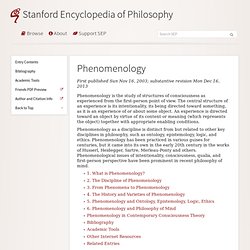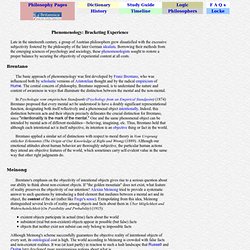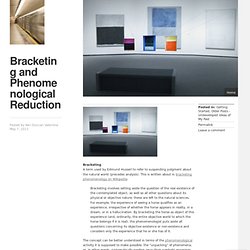

IEP on Phenomenology. First published Sun Nov 16, 2003; substantive revision Mon Dec 16, 2013 Phenomenology is the study of structures of consciousness as experienced from the first-person point of view.

The central structure of an experience is its intentionality, its being directed toward something, as it is an experience of or about some object. An experience is directed toward an object by virtue of its content or meaning (which represents the object) together with appropriate enabling conditions. Phenomenology as a discipline is distinct from but related to other key disciplines in philosophy, such as ontology, epistemology, logic, and ethics. Phenomenology has been practiced in various guises for centuries, but it came into its own in the early 20th century in the works of Husserl, Heidegger, Sartre, Merleau-Ponty and others. 1.
Phenomenology is commonly understood in either of two ways: as a disciplinary field in philosophy, or as a movement in the history of philosophy. 2. 3. Phenomenology: Bracketing Experience. Phenomenology: Bracketing Experience Late in the nineteenth century, a group of Austrian philosophers grew dissatisfied with the excessive subjectivity fostered by the philosophy of the later German idealists.

Borrowing their methods from the emerging sciences of psychology and sociology, these phenomenologists sought to restore a proper balance by securing the objectivity of experiential content at all costs. Brentano The basic approach of phenomenology was first developed by Franz Brentano, who was influenced both by scholastic versions of Aristotelian thought and by the radical empiricism of Hume.
The central concern of philosophy, Brentano supposed, is to understand the nature and content of awareness in ways that illuminate the distinction between the mental and the non-mental. Brentano applied a similar set of distinctions with respect to moral theory in Vom Ursprung sittlicher Erkenntnis (The Origin of Our Knowledge of Right and Wrong) (1889). Meinong Husserl. Bracketing and Phenomenological Reduction.
BracketingA term used by Edmund Husserl to refer to suspending judgment about the natural world (precedes analysis).

This is written about in bracketing phenomenology on Wikipedia: Bracketing involves setting aside the question of the real existence of the contemplated object, as well as all other questions about its physical or objective nature; these are left to the natural sciences. For example, the experience of seeing a horse qualifies as an experience, irrespective of whether the horse appears in reality, in a dream, or in a hallucination. By bracketing the horse as object of this experience (and, ordinarily, the entire objective world to which the horse belongs if it is real), the phenomenologist puts aside all questions concerning its objective existence or non-existence and considers only the experience that he or she has of it. Empirical subjectivity is suspended by the process of bracketing described above. Like this: Like Loading...
Edmund Husserl (1859-1938)